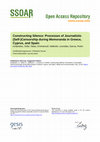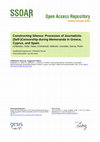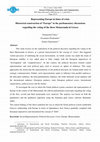Papers by Emmanouil (Manos) Takas
In January 2019, the increased borrowing needs of Greece, which signalled the concept of 'public ... more In January 2019, the increased borrowing needs of Greece, which signalled the concept of 'public debt crisis', led the rating agency Standard & Poor's to downgrade the country's credit rating from A to A-. Under such pressure, the prime minister of Greece, K. Karamanlis, affiliated with New Democracy (ND) (the Greek right-wing party), announced early elections for 4 October 2009, where PASOK (the Greek centre party) emerged as the winning party with a percentage of 43.92% with the party leader G. Papandreou uttering the characteristic words 'The money's there'. Sixteen days later, on 20 October 2009, the-at the time-Minister of Finance G. Papakonstantinou announced to ECOFIN that the deficit for 2009 would be around 12.7% as a percentage of GDP and not 6%, as had been calculated by the previous government of ND. At the same time, on 22 October, the rating agency Fitch downgraded
French Journal for Media Research, 2016
Cet article examine l'opérationnalisation du cadre stratégique comme un instrument de stratég... more Cet article examine l'opérationnalisation du cadre stratégique comme un instrument de stratégie de communication dans le système de communication politique grecque. Le cadrage est exploré comme un instrument visant à délégitimer l'opposant par des justifications normatives de contre-cadrage. D'autres facettes de cadrage stratégique sont analysées.Τhis paper examines the operationalization of strategic frame as a tool of strategic political communication within the Greek political communication system. Strategic framing is explored as a tool of delegitimizing the opponent by counter-framing normative rationales and further facets of strategic framing are analysed.

Η παρούσα διατριβή επικεντρώνεται στη μελέτη του πολιτικού λόγου αναφορικά με την ψήφιση των τριώ... more Η παρούσα διατριβή επικεντρώνεται στη μελέτη του πολιτικού λόγου αναφορικά με την ψήφιση των τριών Μνημονίων στην Ελλάδα, σε μια χρονική περίοδο που χαρακτηρίστηκε από την έννοια της «κρίσης», η οποία πυροδότησε βίαιες διαδικασίες επανανοηματοδότησης του κοινωνικού περιβάλλοντος. Καθώς η ελληνική κοινωνία βρέθηκε υπό την ασφυκτική πίεση της ευρωπαϊκής «σταθερότητας» κλήθηκε να συμμορφωθεί πλήρως με τις ευρωπαϊκές επιταγές περί «ανάπτυξης» και «ανταγωνιστικότητας». Σε αυτό το περικείμενο, ο πολιτικός λόγος συγκρότησε κεντρικές αναπαραστάσεις και κάθε πολιτικό κόμμα προσπάθησε να αυξήσει τη σφαίρα επιρροής του. Στη συγκεκριμένη διατριβή ακολουθείται η προσέγγιση ότι οι αναπαραστάσεις στον πολιτικό λόγο μελετώνται και διερευνώνται μέσα από τα ερμηνευτικά σχήματα, τα οποία συγκροτούνται υπό όρους στρατηγικής επικοινωνίας και φιλοδοξούν να ασκήσουν επιρροή σε τέσσερα παράλληλα ακροατήρια: Στο ενδοκομματικό, στο ενδο-κοινοβουλευτικό, στο ευρύτερα ενδοκρατικό κοινωνικό και στο εξωκρατικό (...

Media and Communication, 2020
What are to be considered as threats against journalism? Whereas the literature on safety of jour... more What are to be considered as threats against journalism? Whereas the literature on safety of journalists mainly discusses threats as part of armed conflicts, this article studies how other kinds of conflicts such as economic strangulation and the viability threat represent threats against journalists’ work and safety. It argues that acts of intimidation directed against journalists represent an attack on democracy itself as they have the effect of limiting the freedom of expression. The aim of this study is to explore how journalists operate in such a conflict and under such uncertainty, as an implication of (political) pressure caused by the politics of Memoranda in Greece, Cyprus, and Spain. The comparative analysis focuses on possible changes in the processes of message construction and in the journalistic practices of the participants, exploring if, how, and to what extent these changes were imposed to journalists directly or indirectly.
Journalism and Digital Content in Emerging Media Markets

Journal of Law and Administration, 2020
The main purpose of the present studyis to explore and evaluate the diachronic relations between ... more The main purpose of the present studyis to explore and evaluate the diachronic relations between Russia and Cyprus, noting their historical context and to examine the perceived image1 of Russia in the Cypriot press, during the crucial period of Eurogroup’s decisions of March 2013.In 1878 the UK rented Cyprus from the Ottoman Empire in exchange of a British promise to help Turkey against Russia. In 1914, the UK annexed the island and Cyprus became a British Colony because the Ottoman Empire entered the First World War on the side of the central powers. According to the Treaty of Lausanne (1923), the Ottomans quitted all of their requirements on Cyprus-and the new status led the UK to declare the island as a Crown’s colony in 1925 (Stavrinides 1975, p.2). This event coincided with the creation of the Communist Party of Cyprus (1926) as a blueprint for the global resonance that the Bolshevik movement gained, expressed in the October 1917 Revolution. These events resulted in cultivating...

Volume 2, Issue 1, June 2020, 2020
This study focuses on the exploration of the political discourse regarding the voting of the thre... more This study focuses on the exploration of the political discourse regarding the voting of the three Memoranda in Greece, at a period characterized by the concept of "crisis", that triggered violent processes of redefining the social environment. As Greek society was under the strain of European stability, it was called upon to fully comply with the European imperatives of "development" and "competitiveness". In this context, the political discourse formed central representations and each political party tried to increase its sphere of influence. This study approaches the notion that the representations in the political discourse are formed under terms of strategic communication. Further, such representations aspire to influence four parallel audiences: the intra-party audience, the intra-parliamentary audience, the wider intrastate social audience and the international audience (European partners, main European political actors, international organizations, political actors and the media). To investigate the way in which the Greek political system constructs the representation of Europe in the context of the Memoranda, the official parliamentary transcripts regarding the voting of the first, second and third memoranda were analysed. The analysis was based on both the quantitative and the qualitative approach, using the Iramuteq open source software (Ratinaud, 2009). The central findings of this thesis underline the way in which the Greek political system established Greece's relationship with Europe in terms of dependence, how Greece gradually complied with European imperatives and internalized the concept of "Debt".

Media and Communication ISSN: 2183-2439, 2020
What are to be considered as threats against journalism? Whereas the literature on safety of jour... more What are to be considered as threats against journalism? Whereas the literature on safety of journalists mainly discusses threats as part of armed conflicts, this article studies how other kinds of conflicts such as economic strangulation and the viability threat represent threats against journalists' work and safety. It argues that acts of intimidation directed against journalists represent an attack on democracy itself as they have the effect of limiting the freedom of expression. The aim of this study is to explore how journalists operate in such a conflict and under such uncertainty, as an implication of (political) pressure caused by the politics of Memoranda in Greece, Cyprus, and Spain. The comparative analysis focuses on possible changes in the processes of message construction and in the journalistic practices of the participants, exploring if, how, and to what extent these changes were imposed to journalists directly or indirectly.

Journal of Law and Administration
The main purpose of the present study is to explore and evaluate the diachronic relations between... more The main purpose of the present study is to explore and evaluate the diachronic relations between Russia and Cyprus, noting their historical context and to examine the perceived image1 of Russia in the Cypriot press, during the crucial period of Eurogroup’s decisions of March 2013.In 1878 the UK rented Cyprus from the Ottoman Empire in exchange of a British promise to help Turkey against Russia. In 1914, the UK annexed the island and Cyprus became a British Colony because the Ottoman Empire entered the First World War on the side of the central powers. According to the Treaty of Lausanne (1923), the Ottomans quitted all of their requirements on Cyprus-and the new status led the UK to declare the island as a Crown’s colony in 1925 (Stavrinides 1975, p.2). This event coincided with the creation of the Communist Party of Cyprus (1926) as a blueprint for the global resonance that the Bolshevik movement gained, expressed in the October 1917 Revolution. These events resulted in cultivatin...

JEICOM, 2020
This study focuses on the exploration of the political discourse regarding the voting of the thre... more This study focuses on the exploration of the political discourse regarding the voting of the three Memoranda in Greece, at a period characterized by the concept of "crisis", that triggered violent processes of redefining the social environment. As Greek society was under the strain of European stability, it was called upon to fully comply with the European imperatives of "development" and "competitiveness". In this context, the political discourse formed central representations and each political party tried to increase its sphere of influence. This study approaches the notion that the representations in the political discourse are formed under terms of strategic communication. Further, such representations aspire to influence four parallel audiences: the intra-party audience, the intra-parliamentary audience, the wider intrastate social audience and the international audience (European partners, main European political actors, international organizations, political actors and the media). To investigate the way in which the Greek political system constructs the representation of Europe in the context of the Memoranda, the official parliamentary transcripts regarding the voting of the first, second and third memoranda were analysed. The analysis was based on both the quantitative and the qualitative approach, using the Iramuteq open source software (Ratinaud, 2009). The central findings of this thesis underline the way in which the Greek political system established Greece's relationship with Europe in terms of dependence, how Greece gradually complied with European imperatives and internalized the concept of "Debt".
Επικοινωνία και Πολιτική στην Σκιά του Brexit. Αφιέρωμα στο επιστημονικό περιοδικό Διεθνής και Ευ... more Επικοινωνία και Πολιτική στην Σκιά του Brexit. Αφιέρωμα στο επιστημονικό περιοδικό Διεθνής και Ευρωπαϊκή Πολιτική Τεύχος 39. Επιστημονική επιμέλεια: Αθ.Ν. Σαμαράς Περιεχόμενα & Εισαγωγικό Σημείωμα.
Επιστημονικό Διαπανεπιστημιακό Συνέδριο: «Προσφυγικό και Brexit: Πολιτική Ρητορική, Μέσα Ενημέρωσ... more Επιστημονικό Διαπανεπιστημιακό Συνέδριο: «Προσφυγικό και Brexit: Πολιτική Ρητορική, Μέσα Ενημέρωσης και Εικόνες Κρατών». Συνδιοργάνωση: Εργαστήριο Στρατηγικής Επικοινωνίας και Μέσων Ενημέρωσης, Τμήμα Διεθνών και Ευρωπαϊκών Σπουδών Πανεπιστήμιο Πειραιώς, Μεταπτυχιακό Πρόγραμμα Σπουδών Επικοινωνία και Δημοσιογραφία - Ανοικτό Πανεπιστήμιο Κύπρου, Πειραιάς 20 Οκτωβρίου 2016, Πανεπιστήμιο Πειραιώς, Πορτοκαλί Αμφιθέατρο.
Τάκας, Ε. & Σαμαράς, Α.Ν. (2015). «Απόδοση (υπ)Αιτιότητας για το Δεύτερο Μνημόνιο στην Ελληνική ... more Τάκας, Ε. & Σαμαράς, Α.Ν. (2015). «Απόδοση (υπ)Αιτιότητας για το Δεύτερο Μνημόνιο στην Ελληνική Βουλή». Δημοσιογραφία, Τεύχος 8-9, σελ.27-33.
Takas, E. & Samaras, A.N. (2016). «Legitimation and De-legitimation Processes of Memorandum II in... more Takas, E. & Samaras, A.N. (2016). «Legitimation and De-legitimation Processes of Memorandum II in Greece: Facets of Strategic Framing in Greek Parliamentary Discourse». French Journal For Media Research, 5:1-23
Abstract
Τhis paper examines the operationalization of strategic frame as a tool of strategic political communication within the Greek political communication system. Strategic framing is explored as a tool of delegitimizing the opponent by counter-framing normative rationales and further facets of strategic framing are analysed.

Abstract
Aim of this occasional paper is to explore the role of attribution theory as a daily, a... more Abstract
Aim of this occasional paper is to explore the role of attribution theory as a daily, automated process of understanding and evaluating the social environment. The study of causal relationships reveals two issues: First, on a non-intentional level of communication, the groups, in which one belongs and secondly, at the level of intentional communication, strategies of managing and interpreting situations. The dialectic between these two aspects
reveals the way that actions of strategic communication enhance or degrade identities and meanings. Additionally, the cognitive routes during attribution judgements are explored, as well as the terms “cognitive map”, heuristics and “cognitive biases”.
Περίληψη
Στόχος της παρούσας δημοσίευσης αποτελεί η διερεύνηση της θεωρίας απόδοσης αιτιότητας ως καθημερινή και αυτόματη διαδικασία ερμηνείας του κοινωνικού περιβάλλοντος. Η μελέτη των παραγωγικών αιτιών αποκαλύπτει δύο θέματα: Πρώτον, σε επίπεδο μη εμπρόθετης επικοινωνίας, τις ομάδες στις οποίες ανήκει κάποιος και δεύτερον, σε επίπεδο εμπρόθετης επικοινωνίας τις στρατηγικές διαχείρισης της ερμηνείας των καταστάσεων. Η διαλεκτική ανάμεσα σε αυτά τα δύο αφορά τον τρόπο με τον οποίο οι δράσεις της στρατηγικής επικοινωνίας ενισχύουν ή αποδομούν ταυτότητες και έννοιες. Επιπροσθέτως, εξετάζονται οι γνωσιακές διαδρομές κατά την απόδοση αιτιότητας, η έννοια του γνωσιακού χάρτη και της ευρετικής καθώς και οι εγγενείς μεροληψίες.
Conference Presentations by Emmanouil (Manos) Takas

By thinking on the state as a person, people attribute to it a series of attributions that stem f... more By thinking on the state as a person, people attribute to it a series of attributions that stem from peoples’ characteristics, such as intention, logic, personality and identity (Wendt, 2004). Thus, each state is considered to be an “as if” person and the image of the state is constructed under personality traits and psychological personhood.
The rhetoric of blame, or “blame game”, refers to the processes of attribution of responsibility that arise after a failure or crisis. In such a case, actors typically try to deflect their own part of responsibility, by shifting the blame to other actors. By attributing responsibility to a personified state, the blame functions as instrument of domestication of failure, that stems from the state’s internal and stable characteristics (Weiner, 2004). Thus the personified state is self-accountable for the failure or crisis and external factors affecting or causing the failure are not examined.
Under this theoretical concept, international states, non-state actors, politicians or leaders form positive or negative images of their own state or others. Subsequently, these images are usually being formed through their narrative in a context of attack against the reputation or the image of a country in order to achieve specific objectives.
This paper explores the German narrative during the re-negotiation of the Greek rescue plan - memorandum in the Eurogroup from February until June 2015. The research focuses on the discourse of Schäuble and the image formation attitudes, demonization and blame games he employed to construct a specific image on Greece in order to achieve diplomatic goals. This qualitative content analysis in Schäuble’s discourse for a period of five months (January - June) is driven from the following research questions:
How are the procedures of personification and personalization employed in Schäuble’s discourse?
How is responsibility attributed to Greece regarding the causes of the financial crisis?
How is the image of Greece being formed through the strategies used by Schäuble?
Εργαστήρι Στρατηγικής Επικοινωνίας και Μέσων Ενημέρωσης, Τμήμα Διεθνών και Ευρωπαϊκών Σπουδών. Πα... more Εργαστήρι Στρατηγικής Επικοινωνίας και Μέσων Ενημέρωσης, Τμήμα Διεθνών και Ευρωπαϊκών Σπουδών. Πανεπιστήμιο Πειραιώς
suggested that people have two basic needs • A) To construct a coherent interpretation of the soc... more suggested that people have two basic needs • A) To construct a coherent interpretation of the social world and • B) To acquire control over their environment. • Thus, by interpreting the behavior of others one seeks stability, control and forecast.











Uploads
Papers by Emmanouil (Manos) Takas
Abstract
Τhis paper examines the operationalization of strategic frame as a tool of strategic political communication within the Greek political communication system. Strategic framing is explored as a tool of delegitimizing the opponent by counter-framing normative rationales and further facets of strategic framing are analysed.
Aim of this occasional paper is to explore the role of attribution theory as a daily, automated process of understanding and evaluating the social environment. The study of causal relationships reveals two issues: First, on a non-intentional level of communication, the groups, in which one belongs and secondly, at the level of intentional communication, strategies of managing and interpreting situations. The dialectic between these two aspects
reveals the way that actions of strategic communication enhance or degrade identities and meanings. Additionally, the cognitive routes during attribution judgements are explored, as well as the terms “cognitive map”, heuristics and “cognitive biases”.
Περίληψη
Στόχος της παρούσας δημοσίευσης αποτελεί η διερεύνηση της θεωρίας απόδοσης αιτιότητας ως καθημερινή και αυτόματη διαδικασία ερμηνείας του κοινωνικού περιβάλλοντος. Η μελέτη των παραγωγικών αιτιών αποκαλύπτει δύο θέματα: Πρώτον, σε επίπεδο μη εμπρόθετης επικοινωνίας, τις ομάδες στις οποίες ανήκει κάποιος και δεύτερον, σε επίπεδο εμπρόθετης επικοινωνίας τις στρατηγικές διαχείρισης της ερμηνείας των καταστάσεων. Η διαλεκτική ανάμεσα σε αυτά τα δύο αφορά τον τρόπο με τον οποίο οι δράσεις της στρατηγικής επικοινωνίας ενισχύουν ή αποδομούν ταυτότητες και έννοιες. Επιπροσθέτως, εξετάζονται οι γνωσιακές διαδρομές κατά την απόδοση αιτιότητας, η έννοια του γνωσιακού χάρτη και της ευρετικής καθώς και οι εγγενείς μεροληψίες.
Conference Presentations by Emmanouil (Manos) Takas
The rhetoric of blame, or “blame game”, refers to the processes of attribution of responsibility that arise after a failure or crisis. In such a case, actors typically try to deflect their own part of responsibility, by shifting the blame to other actors. By attributing responsibility to a personified state, the blame functions as instrument of domestication of failure, that stems from the state’s internal and stable characteristics (Weiner, 2004). Thus the personified state is self-accountable for the failure or crisis and external factors affecting or causing the failure are not examined.
Under this theoretical concept, international states, non-state actors, politicians or leaders form positive or negative images of their own state or others. Subsequently, these images are usually being formed through their narrative in a context of attack against the reputation or the image of a country in order to achieve specific objectives.
This paper explores the German narrative during the re-negotiation of the Greek rescue plan - memorandum in the Eurogroup from February until June 2015. The research focuses on the discourse of Schäuble and the image formation attitudes, demonization and blame games he employed to construct a specific image on Greece in order to achieve diplomatic goals. This qualitative content analysis in Schäuble’s discourse for a period of five months (January - June) is driven from the following research questions:
How are the procedures of personification and personalization employed in Schäuble’s discourse?
How is responsibility attributed to Greece regarding the causes of the financial crisis?
How is the image of Greece being formed through the strategies used by Schäuble?
Abstract
Τhis paper examines the operationalization of strategic frame as a tool of strategic political communication within the Greek political communication system. Strategic framing is explored as a tool of delegitimizing the opponent by counter-framing normative rationales and further facets of strategic framing are analysed.
Aim of this occasional paper is to explore the role of attribution theory as a daily, automated process of understanding and evaluating the social environment. The study of causal relationships reveals two issues: First, on a non-intentional level of communication, the groups, in which one belongs and secondly, at the level of intentional communication, strategies of managing and interpreting situations. The dialectic between these two aspects
reveals the way that actions of strategic communication enhance or degrade identities and meanings. Additionally, the cognitive routes during attribution judgements are explored, as well as the terms “cognitive map”, heuristics and “cognitive biases”.
Περίληψη
Στόχος της παρούσας δημοσίευσης αποτελεί η διερεύνηση της θεωρίας απόδοσης αιτιότητας ως καθημερινή και αυτόματη διαδικασία ερμηνείας του κοινωνικού περιβάλλοντος. Η μελέτη των παραγωγικών αιτιών αποκαλύπτει δύο θέματα: Πρώτον, σε επίπεδο μη εμπρόθετης επικοινωνίας, τις ομάδες στις οποίες ανήκει κάποιος και δεύτερον, σε επίπεδο εμπρόθετης επικοινωνίας τις στρατηγικές διαχείρισης της ερμηνείας των καταστάσεων. Η διαλεκτική ανάμεσα σε αυτά τα δύο αφορά τον τρόπο με τον οποίο οι δράσεις της στρατηγικής επικοινωνίας ενισχύουν ή αποδομούν ταυτότητες και έννοιες. Επιπροσθέτως, εξετάζονται οι γνωσιακές διαδρομές κατά την απόδοση αιτιότητας, η έννοια του γνωσιακού χάρτη και της ευρετικής καθώς και οι εγγενείς μεροληψίες.
The rhetoric of blame, or “blame game”, refers to the processes of attribution of responsibility that arise after a failure or crisis. In such a case, actors typically try to deflect their own part of responsibility, by shifting the blame to other actors. By attributing responsibility to a personified state, the blame functions as instrument of domestication of failure, that stems from the state’s internal and stable characteristics (Weiner, 2004). Thus the personified state is self-accountable for the failure or crisis and external factors affecting or causing the failure are not examined.
Under this theoretical concept, international states, non-state actors, politicians or leaders form positive or negative images of their own state or others. Subsequently, these images are usually being formed through their narrative in a context of attack against the reputation or the image of a country in order to achieve specific objectives.
This paper explores the German narrative during the re-negotiation of the Greek rescue plan - memorandum in the Eurogroup from February until June 2015. The research focuses on the discourse of Schäuble and the image formation attitudes, demonization and blame games he employed to construct a specific image on Greece in order to achieve diplomatic goals. This qualitative content analysis in Schäuble’s discourse for a period of five months (January - June) is driven from the following research questions:
How are the procedures of personification and personalization employed in Schäuble’s discourse?
How is responsibility attributed to Greece regarding the causes of the financial crisis?
How is the image of Greece being formed through the strategies used by Schäuble?
The rhetoric of blame, or “blame game”, refers to the processes of attribution of responsibility that arise after a failure or crisis. In such a case, actors typically try to deflect their own part of responsibility, through e.g. the use of strategic frames.
The global downturn in the economy triggered processes of blame, particularly in the countries at the center of the financial crisis (Hart and Tindall 2009). Aim of this project is to employ attribution theory in order to explore how processes of attribution have affected framing contents within Greek crisis discourse.
The research questions guiding the research are:
(a) To what extend and to what effect are attributional cognitive biases integrated into the formulation of the framing contest?
(b) To what extend the employment of attributional cognitive biases during the parliamentary discussion is affected by factors like: party, speaker and subtopic of discussion?
Discourse analysis is employed in order to identify each observable case of attribution, dominant frame related organizing the statement and the attributional cognitive bias appear and consequently employing statistical analysis.
The majority of the attribution was made to internal factors of Greece (64%), while 23 % to external factors and 13% to Memorandum II itself.This overemphasis to internal factors, which contradicts to the theory (where in cases of failure or of negative outcome people tend to seek attribution to external factors) could be interpreted as an outcome of a party-driven strategic communication planning.If there is no strategic planning, this outcome shows that the party-identity outclasses the national-identity, where partisanship is more important than national interest.
The Government (PASOK, ND, PM Papadimos) gathers the majority of attributions (Inter-parliamentary problems (88,90%), destruction of the country (83,3%), political initiatives (100%) and terrorizing(100%).This shows a political discourse based on party-logic and a strong tension to deconstruct the two main parties (PASOK and ND).
Attacks have dominated the parliamentary discussion. All parties’ rhetoric shows strong preference to attacks, as a way of deconstructing the opponent.PASOK and ND have also used acclaims and defenses, the first for their political achievements regarding Memorandum II and the second as a way of protecting their identity and image from attacks. LAOS has used acclaims to elaborate on why the party left the governmental formation (since it was part of the government under PM Papadimos).Syriza and KKE showed an excessive use of attacks (Syriza: 100%, KKE 96,7%), in order to deconstruct the government and LAOS.PM Papadimos used mainly acclaims (52,9%), as a way of presenting Memorandum II as a good opportunity for Greece.
Αναστοχασμών: Εικόνες Κρατών και Πολιτιστική Διπλωματία
– Πρακτικές Εφαρμογές και Ασκήσεις», Πειραιάς: Εργαστήριο
Στρατηγικής Επικοινωνίας και Μέσων Ενημέρωσης,
Πανεπιστήμιο Πειραιώς